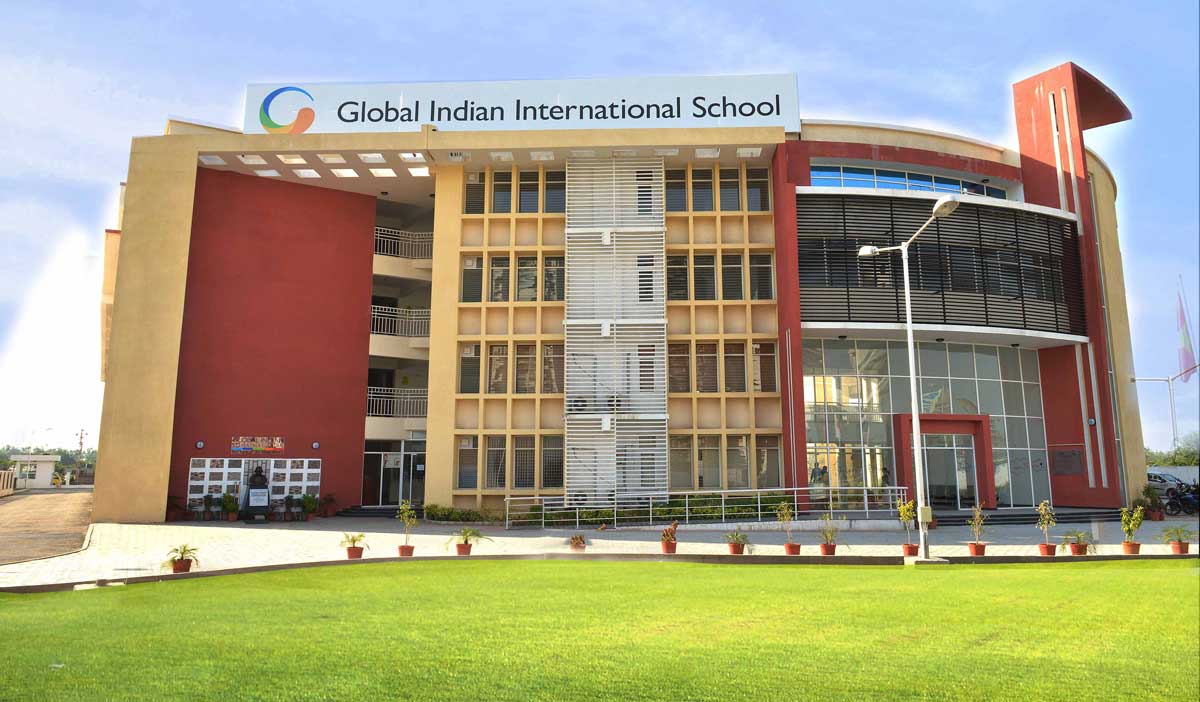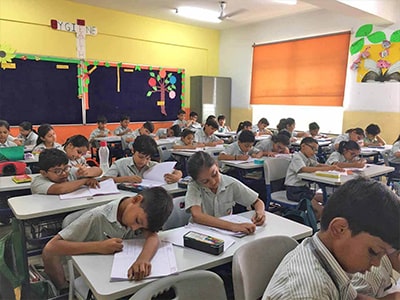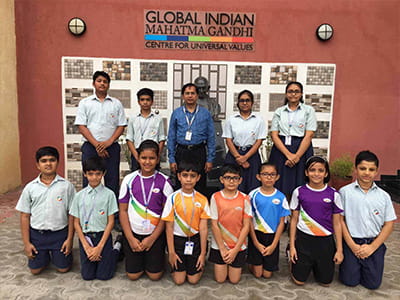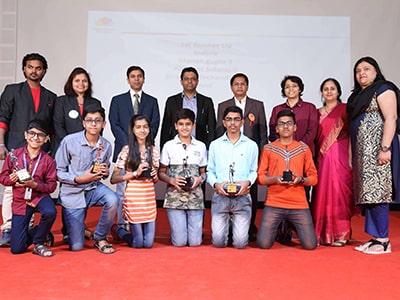Download our FREE Academic Calendar now! 📚 Start your child’s journey to success.
National education is one of the essential pillars for societal development, fostering inclusive growth and collective growth. Celebrated every year on November 11th honouring the birth anniversary of Maulana Abdul Kalam Azad, this day uplifts the educational standards of the country.
The national education system recognises the contribution and the essential role of Maulana Azad to Indian education. The day also serves as a reminder about the importance of education in shaping the future of the nation. The National Education Day ensures that the legacy of Maulana Azad is carried forward so everyone has access to education and is empowered by it.
Let us delve into the importance of National Education Day, its historical perspective, and its benefits for shaping the nation.
Historical Perspective on National Education in India
The concept of national education has a rich historical foundation and is rooted in the country’s ancient education system in India. As India’s first Education Minister, Maulana Azad established critical and successful educational institutes. His vision helped in making quality education accessible to everyone while bridging the gap between quality education and availability.
He focused on developing an education system that reflected India’s cultural heritage and also addressed the needs of its people. Maulana Azad firmly believed that education has the power to uplift individuals to make more informed decisions about their future.
He helped in building the foundation of India’s education system post-independence. With its efforts in India’s education, India strives to develop itself as a global knowledge hub.
Importance of National Education in Modern India
Economic Growth and Development:
National education helps in economic growth and development, leading to a skilled workforce. This enhances productivity and innovation, fostering the development of human capital which is crucial for India’s economic growth.
Social Empowerment:
Education empowers individuals with the knowledge and skills to improve their living standards. It provides opportunities so every child should have access to the best education in the reputed CBSE school.
Promoting National Unity:
It also promotes understanding and respect for different cultures, languages, and religions. It ensures that the citizens are aware of the nation’s valuable history, values, and constitutional rights.
Sustainable Development:
National Education Day helps in achieving sustainable development goals by educating the people to make better-informed decisions. It also lays the foundation for scientific and technological progress to help India become a global leader in innovation.
The theme of National Education Day in India
The theme of National Education Day in India promotes awareness about education and improving the quality of education in the country. It provides an opportunity to reflect on the educational quality in India along with the possibilities for improvements. This day also recognises the efforts of educators and reputed institutions in shaping the future of the country.
The National Education Day Theme 2024 is “Learning for Lasting Peace” which promotes quality and inclusive education. It aims to empower the young minds of the country with the knowledge to thrive in the evolving world. It highlights that education should foster creativity, problem-solving, critical thinking, and emotional intelligence.
Role of Government Policies in Shaping National Education
On the national educational day, the government often introduces new educational policies and initiatives. These policies address the current challenges and shortcomings in the education system to ensure the possibilities for improvements.
These are the top government policies and initiatives aligned with National Education Day:
National Education Policy (NEP) 2020:
This policy aims to transform the Indian education system by promoting multidisciplinary learning, technology integration, and critical thinking. It focuses on experiential and inclusive education while maintaining global standards.
Right to Education Act:
This act of 2009 mandates free and compulsory education for children between 6 to 14 years of age. This promotes social equality by making education accessible to everyone irrespective of their culture, religion, and background.
Samagra Shiksha Abhiyan:
This initiative provides quality education to pre-primary and senior secondary levels, especially to the marginalised groups.
Why Do We Celebrate National Education Day?
The National Education Day is celebrated to honour the contributions and developments of Maulana Abdul Kalam Azad. The day also reminds and highlights the importance of education to improve their lifestyles. It also promotes literacy and awareness about the government’s efforts to enhance educational access and quality.
Moreover, National Education Day also encourages students, educators, and the government to focus on possible measures for improving educational standards. The day celebrates India’s educational achievements while renewing its commitment to improving education for everyone.
Benefits of a Strong National Education System
A strong national education system ensures and brings numerous benefits like:
Economic Growth:
A well-educated workforce drives economic productivity and innovation.
Social Development:
It reduces poverty and improves the living standards of the people by equipping them with skills and employment opportunities.
Encourages Innovation and Progress:
Education fosters creativity, problem-solving skills, and critical thinking, encouraging innovation and progress. It also ensures technological advancements.
Civic Responsibility:
The impact of education fosters civic awareness and active participation in democratic processes.
Inclusion:
It ensures providing quality education to all sections of the society; thereby reducing inequality and injustice.
Global Competitiveness:
A strong education system enhances India’s global competitiveness by providing a skilled workforce that meets international standards.
Future of National Education in India
The national education system looks very promising in India. With advanced educational policies, digital learning, and an increased focus on inclusivity, quality education is available for everyone. The integration of technology and the expansion of online learning platforms bridge gaps in education, especially in remote areas.
With a greater focus on vocational training and a multidisciplinary learning approach, the education system is likely to become flexible and adaptable. However, future challenges like underfunding, infrastructure gaps, the need for trained teachers, etc. must be addressed to realise the full potential of the education system.
Also Read: All About New Education Policy 2020
Conclusion
Undoubtedly, national education is the centre of India’s development and progress. By improving educational access and ensuring quality learning for everyone, India is building an informed and equitable society.
As one of the best international schools in Ahmedabad, GIIS recognises the importance of education for its students. The school takes all necessary initiatives to create an inclusive environment that fosters quality education and learning at all levels.
National Education Day reflects the critical role of education in the growth of individuals and the development of the nation. By promoting digital learning and participating in educational reforms, every person can contribute to shaping the future of national education in India.
FAQs
How does education contribute to economic growth?
Education develops human capital, enhances workforce skills, promotes innovation, and increases productivity to promote economic growth. An educated workforce is essential for economic growth as it can easily adapt to technical advancements and business trends.
What are the challenges of the education system in India?
Inadequate infrastructure, shortage of trained teachers, unequal access to quality education, underfunding, outdated curriculum, and regional disparities are some of the common challenges. These challenges should be addressed to improve the education system of the country.
How is digital learning changing education?
Digital learning is making education more accessible, flexible, interactive, and reachable for everyone. It enables students to learn from anywhere and at any time they want. Digital learning provides access to a wide range of resources and learning tools, making learning fun and beneficial.

 Ahmedabad Campus
Ahmedabad Campus













![Global Montessori Programme [GMP]](https://staging.globalschools.com/ahmedabad/wp-content/uploads/2023/09/l1.png)










